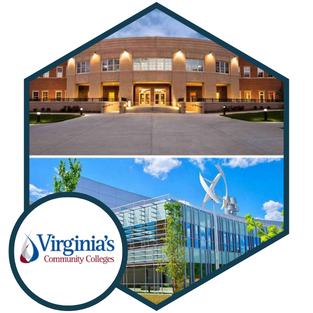With the core belief that everyone should have the right to learn and develop, Virginia Community College System (VCCS) provides flexible pathways in higher education to strengthen individuals and communities. Keep reading to see how partnering with Canvas has enabled this system with 23 individual colleges to create consistency in teaching and learning and invest in student success.
The Challenge
With a total of 23 colleges, it's always been di cult for leaders at VCCS to achieve consistency in usage of its learning management system (LMS). With 40 campuses using their former LMS in di erent ways, leaders at VCCS found it challenging for content to be delivered in a consistent and timely manner that would allow students to focus on course content rather than overcoming navigational hurdles.
The Solution
After using Blackboard for 16 years, VCCS switched to Canvas LMS to unite all of its colleges within one scalable, intuitive platform system that would streamline course creation and maintain a consistent student experience across all campuses. The switch to Canvas gave instructional designers, deans, and academic vice presidents at VCCS a chance to start anew by re-evaluating course-building practices and helping faculty reconsider how an LMS fits into their daily instruction. As they reflected upon their previous LMS practices, they created the following goals for growth:
+ Create a set of best practices for LMS usage that can be used across the state.
+ Improve the student experience by promoting consistency in course creation.
+ Conduct frequent check-ins with faculty to celebrate successes and address challenges with LMS usage.
To start their Canvas adoption o on the right foot, VCCS hosted what they called an “eLearning and Educational Technology Canvas Roadshow,” a comprehensive Canvas training o ered to each college within their system to ensure every institution, regardless of size, was given the tools and resources needed to fully adopt Canvas. In addition to hosting their own training sessions, VCCS also worked closely with Canvas representatives to support their faculty and sta through the transition.
Key Findings
VCCS adopted a six-year plan in 2015 with the intention to triple both academic and professional credentials for all students.
The Commonwealth Committee at VCCS created a set of Canvas best practices to maintain consistency in LMS usage at all of its 23 colleges.
VCCS was well equipped for the transition to online learning during COVID-19 due to the system’s ongoing use of Canvas.
We wanted to create consistency across all 23 colleges while still allowing for creativity and academic freedom, and we could do that with Canvas.
Page Durham, Instructional Designer
“Having front-line support from Canvas freed up our faculty and sta to focus on the bigger picture.”
- David Tod, IT Analyst and LMS Engineer
Following this training process, the commonwealth committee of VCCS, composed of one leader from each of the 23 colleges, came together to create four universal LMS best practices to be used in every course, regardless of instructional delivery method. With many VCCS students attending classes on multiple campuses and remotely, it was essential to establish Canvas guidelines to ensure instruction remained consistent while still allowing for flexibility in program-specific content.
VCCS Best Practices
+ Instructor Presence: Communicate a clear interaction plan with students, share office hours and contact information, post a welcome announcement in each course.
+ Grades: Add all assignments and corresponding due dates into Canvas, and update grades in a timely manner.
+ Syllabus: Create a roadmap to success by defining course expectations and guidelines.
+ Publish: Ensure each component of courses are published and readily available to students.
With a large majority of the student population being first-generation college students, flexible and personalized online learning has always been a priority for VCCS, but trying to establish consistency in such a large system proved to be challenging.
In addition to creating best practices for instruction, the VCCS team came together again to further manage the complexity in Canvas by defining a universal course navigation system, launching Canvas blueprints to allow educators to build from the same template, using modules to guide learning, and leveraging Studio to provide personalized videos for further interaction.
“We learned that the answer to our frustration was to let Canvas do most of the work for us.”
-Terri Milroy, Coordinator of Education Technologies, Southside Virginia Community College
The Results
The creation of these guidelines and united approach to using Canvas created a strong foundation for VCCS to grow from and simplified the transition to online learning during the COVID-19 pandemic. Because each of the colleges within VCCS were already using Canvas consistently, many educators could assist in training new faculty members as needed.
Between April and May of 2020, VCCS hosted over 90 webinars to train 4,000+ faculty members. The sessions ranged from use of specific LTI integrations such as Google Drive and Zoom for delivering online lectures and assignments to Canvas basics such as creating assignments and quizzes.
The expansion of online learning has presented an opportunity for both students and educators to strengthen digital literacy in Virginia. Educators at VCCS will continue to build upon current best practices to improve the student experience and invest in professional development to establish a collaborative Canvas community.
“We know we have a lot of Virginia partners who are new to Canvas and could use our help, and we want to learn from them as well.”
-Page Durham, Instructional Designer
Download Case Study
